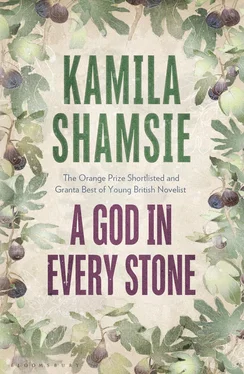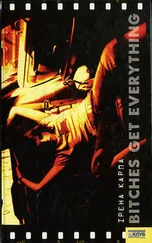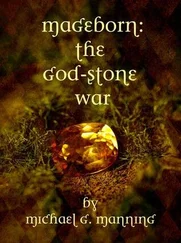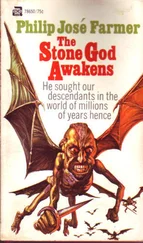— There’s an archaeological site here I’m interested in. Shahji-ki-Dheri.
— The Kanishka Stupa?
— I wouldn’t want to get in the way of the main stupa excavations, of course, but there’s an illuminated white statue at the edge of the stupa complex which I’m interested to see if there’s anything left of.
— Illuminated?
— Probably a story that arose from the sight of moonlight on white marble — but it’s the marble I’m interested in. Why a white marble statue in this place of grey schist? Or is it limestone? I have a theory about trade routes during the Kushan Empire.
As anticipated, his expression fixed into a pretence of interest, allowing her to skip ahead.
— Is the leasing dispute likely to be resolved soon?
— Very soon, I’d imagine. The DC is looking into taking the land away from the owner. It should all be settled by the dig season.
— Hurrah for you, Mr Remmick! That’s a better answer than I’d expected. When is the dig season?
— It can start as early as November. But, Miss Spencer, I should strike a note of caution. I know there’ve been women archaeologists in Greece, in Turkey. Even Egypt. But this is Peshawar. Pathan men don’t much like the idea of women. .
— Don’t much like the idea of women doing what?
— Don’t much like the idea of women.
She thought of the soldier on the train; the ease of the silence between them right at the end. But who knew what he’d really been thinking?
— Are the English in India in the habit of having our behaviour dictated by the Natives?
— Ha! Well expressed.
He raised his glass to her.
— To the dig season!
Silence rolled thick down the mountain, smothering even the calls of the nocturnal birds. Viv collided with a garden chair, the bump of flesh on wood loud in the darkness. Piece by piece she removed every scrap of clothing until she was naked in the moonlit night, the faintest of breezes warm on her skin. Picking up one end of the garden hose she carried it back along the length of itself to the tap and, crouching down on the grass, placed the mouth of it between her shoulder blades, beneath the dip of her neck. A spine of water overlaid her own. Warm at first, but as it drew itself up from the deeper parts of the underground tank it cooled and she stood up, painting every inch of her skin with water, bending her head into it so her hair grew heavy and slicked.
She stood up, looked towards the distant mountains. Tahsin Bey stood behind her, his fingers tracing circles on her skin. The outermost circle was the girdle, the broken bowl, the circlet of mountain ranges, hills and spurs; overlapping it, the tribal areas where men killed each other before breakfast over a chicken, a bad dream, a smile; further in, the British troops protecting Peshawar from the tribesmen; then, the fields and orchards and gardens where the very summer which made the British flee to hill stations brought fruit and fiery-coloured flowers bursting into life; closer now, closer, the proud Englishness of spires and barracks; and right in the centre, the innermost circle, the eye of the storm: Vivian Rose Spencer standing in the garden of her bungalow, a shiver of pleasure running all the way through her.
The familiarity of Peshawar choked off any hope that life might veer in directions Qayyum couldn’t anticipate. No breeze, only heat which shrank his clothes onto his body. He thought of the snake he’d once seen shedding its skin. ‘Shedding’ wasn’t the right word. It simply seemed to glide forward along a pebbled pathway, leaving behind a layer of scales. As though the skin it had lived in was nothing more than a sock. Qayyum had picked up the discarded skin — one piece, split along the snout. He brought the split together and held in his hands a weightless, transparent snake; even the shape of its eyes intact. When he held it up against the sunlight rainbows danced crazily along the length of it, as though something were swirling into life, and he dropped it in terror.
Steps no longer proved a challenge but he still continued to stand in the doorway to the train compartment for a long moment until some movement to his right raised the shameful possibility that someone had seen a blind man in need of help; he hopped down onto the platform — a slight plummet in his stomach before foot hit cement — and walked rapidly away, the knapsack on his back reproachfully light without its soldier’s kit. The bulk of its contents were letters and mementoes from men who lived in the Peshawar Valley: a pebble from Brighton with a rose painted onto it; a photograph of a female aviator; a medal; a bullet compacted by bone; a scrap of paper with a name on it in the ragged writing of someone learning to hold a pen for the first time; a teddy bear with buttons from a soldier’s uniform in place of eyes. When the objects were distributed it would be the end of his service to the Army.
Leaving the station he hailed down a horse-drawn Victoria. He’d become accustomed to being greeted by salutes from children passing by and from the Victoria drivers themselves as soon as they saw the drab-and-green uniform of the 40th. Now it was the missing eye which set him apart. Even when both eyes were closed he knew it was evident something was wrong with the right one, quite apart from the swelling; a translucence to the skin.
The Victoria passed through Kabuli Gate and entered the Street of Storytellers. If a man is to die defending a field, let the field be his field, the land his land, the people his people . But these were not Qayyum’s people — the merchants and traders, the courtesans and maulvis, the money-changers and beggars. The 40th Pathans, those were his people; not just the Yusufzai, but also the Afridis, also the Dogras. He should have fought harder to stay. So he only had one eye. What of it? Nelson had only one eye and one arm. Better to be there than here.
The Victoria approached two Afridi men holding hands — both had long hair, and the taller of the two had a flower behind his ear. In the Army, Qayyum had learned that everything about such men’s appearance and deportment was unbecoming for a soldier (or for any man, one of the officers had snarled), but lying beside the stream that night at Vipers, waiting for the moon to slip out of the sky, he had seen two sepoys of the 40th — Bahadur Khan and Afroze — with fingers interlinked; and then the terrible sobbing when Bahadur Khan’s fingers turned rigid. The sound had carried straight to the German gunners. And there was also this: how would his mind have survived that night without Kalam Khan lying beside him, filling his own mouth with water from the stream so he might blow cool air onto his comrade’s burning face, the proximity which Qayyum had always denied the other man now his only salve.
A train of camels slowed the Victoria’s progress. Qayyum’s hand was a visor in front of both eyes, protecting one, hiding the other, so he didn’t see the Afridi pluck the marigold from behind his ear and press it between Qayyum’s splayed fingers. The petals softer than the lips of the Frenchwoman. He held it against his skin; there had been kindness in Brighton, but never intimacy.
The Victoria turned away from the broad Street of Storytellers and was soon passing by lanes too narrow for it; such little space between the structures on one side of the street and the other that it was possible for a boy to lean out of a window and ask his facing neighbour to tie his turban so that he could run down to his mother and pretend he had managed it all on his own. Almost home now. Allah forgive him, he’d rather be in the trenches.
At the top of the stairs he pushed open the wooden door and dark shapes threw themselves at him; without a sound he stepped back, still gripping the handle, pulling the door shut. Hazrat Ali, at the Battle of Khaybar, ripped a fortress door from its hinges to replace his lost shield. Qayyum’s attackers called his name from the other side of the door and he commanded, Move back, move back, and this time when he re-entered they stood still, expressions uncertain, allowing him to be the one to embrace his father and mother and nod at his three sisters, all married now, looking past them for Najeeb.
Читать дальше












